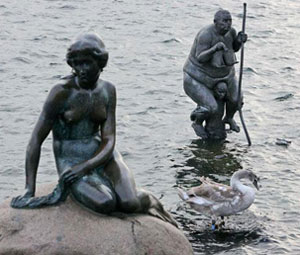 |
| The Survival of the Fattest by Danish sculptor Jens Galschiot was one of the most arresting images that came out of the climate change conference in Copenhagen. It depicts an obese Lady Justice figure, symbolizing the rich industrialized world, sitting on the back of a thin African man. |
Deborah Buszard stood outside in the cold for four hours every day waiting to enter the United Nations Climate Change Conference in Copenhagen, Denmark. Beside her were a range of delegations โ the Thai government officials, French activists, the World Wind Energy Federation members โ that would anxiously wait to enter the full conference.
โThe UN invited three times as many people that could fit into the conference hall,โ says Dr. Buszard, the Associate Director of the ะยผำฦยม๙บฯฒสฟชฝฑึฑฒฅ College of Sustainability. โPeople would miss their meetings or not even get into the conference.โ
Access to the conference itself was one of the many issues that Dr. Buszard, Claire Campbell, Emily Rideout and Meinhard Dolle discussed at a panel regarding the Conference of the Parties (COP) 15 UN conference. The discussion was hosted by the ะยผำฦยม๙บฯฒสฟชฝฑึฑฒฅ College of Sustainability in their Thursday Evening Speaker Series.
Key issues
The goal of COP15 was to create a new agreement to replace the Kyoto Protocol, an agreement which set emission reduction targets to be met by 2012. Each year, delegations from different governments, non-governmental organizations (NGOs) and various industries meet to discuss environmental issues and review of ongoing proposals.
There were five key issues that the UN wanted to achieve at COP15: a shared vision between nations about the environmental goals; agreement on arbitration; adapting environmental practices from developing nations with help from developed nations; giving financial assistance from developed nations to developing nations; and a commitment to developing technology and capacity building to reduce carbon emissions. Only a few of the goals were met.
While most called COP15 a failure, Meinhard Doelle believes there are some good points in the agreement given the difficulties of the process. The environmental law professor has participated in the annual UN conferences for almost 10 years.
โThe most significant victory is an agreement to limit the increase of the global temperature to 2 degrees Celsius,โ says Prof. Doelle. โDeveloped nations also pledged $50 billion for the next three years with more funding to be available in the future. The agreement has the potential to push countries to change.โ
Others on the panel werenโt so optimistic. History professor Claire Campbell was surprised at the lack of progress at the conference. COP15 failed to create a binding agreement. โCountries are not good at dealing with climate change because they donโt have a lot of experience with the issue,โ says Dr. Campbell. โWeโre not good at dealing with sovereignty and multinational issues. Countries had to go through WWII in order to have a functional United Nations. We have the momentum to change but politicians are coming to this issue late in life. Our leaders need to be better and faster in their decisions on solving climate change.โ
Friction
The major issue at COP15 turned out to be the friction between the developed and developing nations. โThe developing want big targets from developed nations but developed nations donโt want to do it,โ says Prof. Doelle. โItโs up to developed nations to put their goals on the table. If they donโt, they have no moral authority to compel developed nations to change.โ
Emily Rideout was one of many young Canadians to attend the conference. The fourth-year ะยผำฦยม๙บฯฒสฟชฝฑึฑฒฅ student blogged about the event as a representative for Sierra Club Canada.
โThe first week of negotiations was powerful for the NGOs,โ says Ms. Rideout. โTo see 100,000 people marching in the streets was special. In the second week, NGO delegations werenโt allowed in. There was no transparency or inclusiveness to the process. It was disappointing.โ
What comes after COP15 remains unclear. Countries have until the next UN meeting to ratify the agreement and set national targets. โFor the least developed countries, survival is not negotiable,โ says Ms. Rideout. โWe need immediate action.โ
